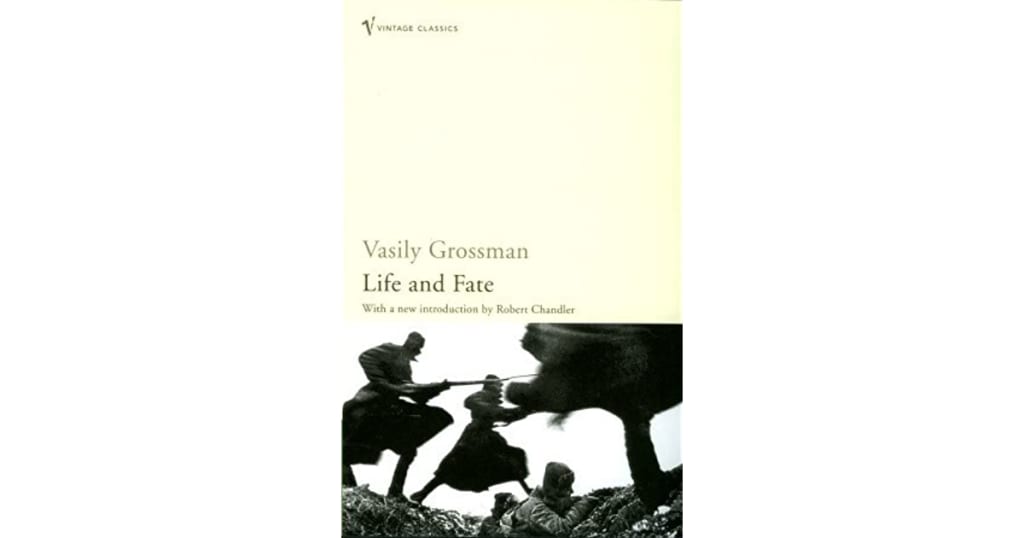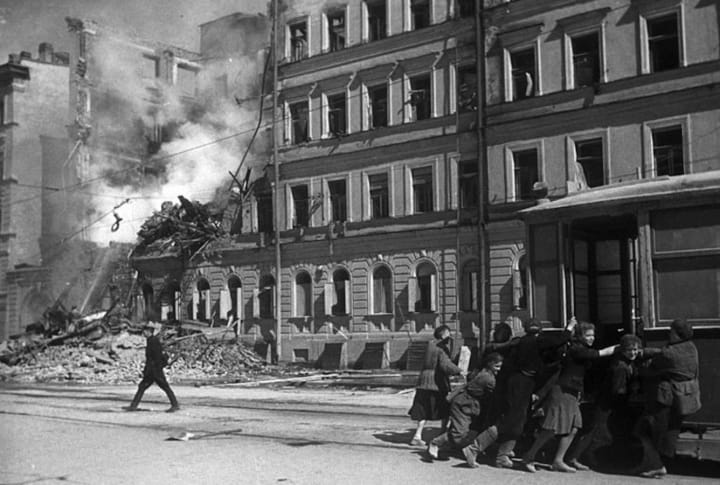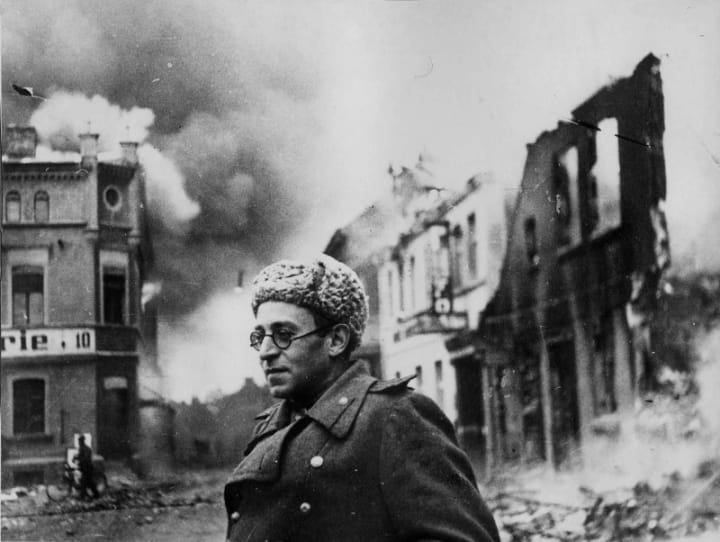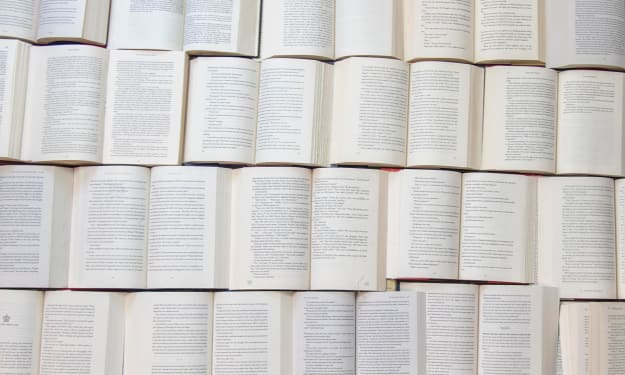“Life and Fate” by Vasily Grossman
First Impressions (Pt. 2)

Vasily Grossman’s “Life and Fate” has normally been called the 20th century’s answer to “War and Peace” by Leo Tolstoy. Set in the midst of Russia’s turmoil at the battle of Stalingrad. The book goes through the various characters’ lives and grieves as they live through not only great turmoil but also great loss. The question of whether death is really glorious at war is one of the things it differs from when it comes to “War and Peace”. In comparison to when people die in death camps to Prince Andrei dying in his home after listening to how Natasha was being unfaithful towards him but forgives her on his deathbed. “Life and Fate” though not as great as its 19th century counterpart by Tolstoy. Throughout the book, there are many quotations, chapters and small speeches by characters that relate to the violence and wrongs of war, the way in which the characters deal with death and how the battle sends many, many people to their demise. But the real question is in this novel is how the lives of the everyday person can survive when the only means for having that life, in this novel, are through violence. It is a very poignant aspect of the novel since the first page states “if you attempt to erase the peculiarities and individuality of life by violence then life itself must suffocate” (p.3). The main message of this book, I believe, is that battle keeps people in fear of dying and in fear of their loved ones dying and so, nobody can really live their lives to the full since they are so focused on how this is all going to end and whether it is going to end at all.
When it comes to the characters, every single one of them seems to have a pervading fear of death. This is either in the form of the death of someone they know, the dead and dying in their country or their own death. The entire book is made up of these strong passages in which the characters take a deep internal look into the meaning of existence by shadowing it with death and violence. Some of this death and violence is also met with religion seeing as Russia is an Eastern Orthodox country, so religion would be quite important when dealing with the meaning of existence because of how strict the religion is. In one instance we have a character who “without leaving the commune, he had begun preaching the gospel and praying to God to take pity on the dying” (p.13). Whereas, we also have another view of religion upon the nature and future of human existence as:
“Where acts of violence are committed” he explained to Mostovsky, “sorrow reigns and blood must flow. I saw the sufferings of the peasantry with my own eyes - and yet collectivisation was carried out in the name of Good. I don’t believe in your ‘Good’. I believe in human kindness.” (p.13)
Obviously the act of ‘Good’ here (capitalised) refers to the religious notion of doing ‘Good’ in the want of reward in whatever afterlife the individual believes in. This shows that there are certain individuals who have given up with the ‘regime’ of things mainly because it no longer fits the lifestyle that they had in mind for humanity. There is now far too much violence involved.

Another way in which the characters tend to contemplate their existence and what it means is through the way they talk about their own sense of time. The sense of time going or passing by as other people die and how, in certain times, the characters are alone. It is one of those existential crises that is most common of the character Krymov:
“‘This is my time’ or ‘No, this is no longer our time.’ Time flows into a man or State, makes its home there and then flows away; and the man and State remain, but their time has passed. Where has their time gone? The man still thinks, breathes and cries, but his time, the time that belonged to him and to him alone, has disappeared.” (p.35)
This paradox of man and State refers to not only the regime but what happens when a certain way of life collapses ready to make way for a new one. It questions whether the older ones must suffer and die or whether they can ever rise up again. Most importantly of all, it refers to the time that once belonged to man (referring to a man present in this current time at which the book is set) is now ready to up and change into something new - leaving the man behind. The ‘State’ has died out and set about its change but because it is not something alive and animate - it cannot feel the change. Whereas, the man has been left all alone.
Another aspect of the war and man’s existential crisis is the amount of sheer violence there is in the novel. The violence is very graphic, intense and contains scenes of everything from the front lines, the gravesites and burials to the death camps all over the various countries. A letter to Vitya describes the violence as being part of the burning question of whether war is ever glorious after all, or whether it just brings eternal suffering:
“The Germans are killing the Jews in the district, children and old men included…the Jewish population is marched into these ditches and shot. Jewish burial mounds are rising up in all the villages round and about. There’s a girl from Poland next door. She says that there the killing goes on continually. The Jews are being massacred…” (p.72)
This is only the beginning of the statements on violence. Introducing who is committing the violence against the innocents is only part of the graphic statement about jewish people being massacred.
“Meanwhile the Germans burst into people’s houses and steal; sentries amuse themselves by shooting children from behind the barbed wire; and more and more people confirm that any day now our fate will be decided…” (p.73)
Not just the violence against the children is being committed as the sentries are shooting them. But also the violence against the homes of others. The savage nature of committing violence against the safest space in a person’s life means that this person no longer has a space in which they belong and can function without care of the war that is going on around them. To delete this space or steal it is perhaps one of the greatest violences of all.

Death is also seen as a strange and lonely thing in the existential crisis because not only do we have the Jewish people that are being needlessly slaughtered, but we also have the men on the front line in Russia. The ones in Stalingrad, the ones preparing for the coming war, the ones that have left the old war etc. Tolya is one of those said characters who, in his existential crisis during Chapter 20, cannot shake the feeling of death being all around him:
“If Tolya were to die, no one would ever tell his father…How would they know what camp to look for him in? Maybe he was already dead…” (p.81)
Be that as it may, it is not until Chapter 31 that we see how this existential crisis from the one that sees death coming towards them to the one who has to deal with the death of a loved one changes and becomes somewhat different. Losing a loved one seems to move a lot slower than actually dying does in this book and that is mostly because of the catharsis of it all. It is Tolya’s mother that weeps for him and “as she said goodbye, she said she was certain he had done everything possible to save her son…” (p.132). Then, in Chapter 32, we get the strangest paradox of all. It is the paradox of the individual and the attitude towards the death of a certain individual:
“Thousands of people are being buried and no one attends the funerals…in peacetime, it is the other way round: one coffin and a hundred people carrying flowers.” (p.135)
This perfectly gives description to the way in which mass murder was now being viewed. Not only does war time give the resident a desensitisation to death and violence, but it also presents an inevitable conclusion; out of war must come violence and out of violence must come death. The political side though, sees it as an imperative obedience:
“The violence of a totalitarian state is so great as to be no longer a means to an end; it becomes an object of mystical worship and adoration…” (p.199)
And only does this sense of totalitarianism lead us on to thinking about the true problem in both Germany and Russia, though they are on opposing sides - fascism and how fascism, in the most machiavellian method was allowed to gain and maintain power by forcing out the obedience through a face of justice, must and the want for a better state. Of course, none of these were actually true and the fact is that fascism was disguising behind them as acting for the good of the people:
“Another fact that allowed fascism to gain power over men was their blindness. A man cannot believe he is about to be destroyed. The optimism of people standing on the edge of the grave is astounding. The soil of hope - a hope that was senseless and sometimes dishonest and despicable - gave birth to a pathetic obedience that was equally despicable.” (p.199)
It is true in the political sense then, that if the totalitarian state were to depict violence as what should be done for the greater good of man then violence would be the resolution for not just the side committing it, but the sacrificial persons involved however against the initial idea they are to begin with. They understand that the totalitarian regime must have them struck off the land in order to make way for a better class of life, no matter how false that statement actually is. It is therefore also true that “everything gave rise to obedience - both hope and hopelessness.” (p.200)
The theme of fate and death crop up over a number of chapters in the book, but no chapter links the political, the fateful, the existential and even the inhumane together like Part 2, Chapter 47 as it goes into detail about the way in which one man is set to be killed by another, seemingly with or without any just reason or cause. Therefore, any political regime with dictator rule can be applied to it in this particular time:
“If one man is fated to be killed by another, it would be interesting to trace the gradual convergence of their paths. At the start they might be miles away from one another - I might be in Pamir picking alpine roses and clicking my camera, while the other man, my death, might be eight thousand miles away, fishing for ruff in a little stream after school. I might be getting ready to go to a concert and he might be at the railway station buying a ticket to go and visit his mother-in-law - yet eventually we are bound to meet, we cannot avoid it…” (p.534)
It is strange that the clearest depiction of killing by another would be in the chapter that mostly focuses on those who died in the death camps and gas chambers. This and chapter 48 of Part 2 give the reader the greatest and perhaps the most sorrowful look into the lives of those condemned to die in gas chambers.
In conclusion. death in “Life and Fate” by Vasily Grossman is nothing clear nor is it anything that has one definition. It is defined by how those experience it at different points in their existence, lives and how, politically, they experience it. The only commonality is that nothing in it. with all of its violence and turbulence, is glorious in any way, shape, or form. It is all horrifying and yet, it is all for the ‘good of the State’.
Citation
Grossman, V (2006). Life and Fate. UK: Vintage.
If you enjoyed “Life and Fate” by Vasily Grossman, then you may also like:
War and Peace by Leo Tolstoy
All Quiet on the Western Front by EM Remarque
Les Miserables by Victor Hugo
About the Creator
Annie Kapur
200K+ Reads on Vocal.
Secondary English Teacher & Lecturer
🎓Literature & Writing (B.A)
🎓Film & Writing (M.A)
🎓Secondary English Education (PgDipEd) (QTS)
📍Birmingham, UK






Comments
There are no comments for this story
Be the first to respond and start the conversation.